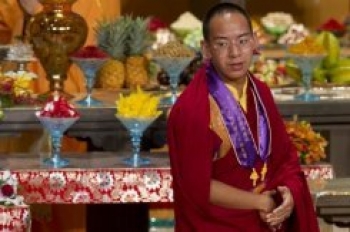 The Panchen Lama is pictured in Hong Kong on April 25. Gyaincain Norbu addressed a world Buddhist forum in his first public appearance outside the mainland.
The Panchen Lama is pictured in Hong Kong on April 25. Gyaincain Norbu addressed a world Buddhist forum in his first public appearance outside the mainland. China's chosen Panchen Lama addressed a world Buddhist forum in Hong Kong in his first public appearance outside the mainland Thursday as Beijing sought to step up its influence over the religion.
Gyaincain Norbu, 22, wore crimson and saffron robes as he espoused Buddhist teachings before hundreds of monks and scholars from around the world.
He spoke about Buddhist doctrines as the essence of 'science of the mind', and purity in the precepts as the foundation for preservation of the Dharma, according to an English copy of the speech.
Aiming at both getting self enlightenment and enlightening others, Buddhism has prospered for 1,000 years, and is now an important component of the world religion, he said in rare public comments.
Tibet's exiled spiritual leader, the Dalai Lama, does not recognise Norbu and appointed another boy, Gedhun Choekyi Nyima, as Panchen Lama in 1995, but the child was detained by Chinese authorities and has not been seen since.
The Panchen Lama traditionally plays a significant role in the choice of the Dalai Lama's successor and is widely seen as Tibetan Buddhism's second-most important spiritual leader.
Since being selected by the state in 1995, the Panchen Lama has been educated under the close watch of the officially atheist Communist Party.
He has made numerous tightly scripted public appearances since he turned 18, but Xinhua news agency said his visit to Hong Kong was his first outside the Chinese mainland.
The forum was backed by the state-sanctioned Buddhist Association of China and heard a congratulatory letter from senior Communist Party official Jia Qinglin, read by another party official, Zhu Weiqun, Xinhua said.
The association has been seen as an attempt by China to extend its influence over Buddhism, especially in the face of its growing global popularity often attributed to the Dalai Lama, who is despised by Beijing as a separatist.
A total of 34 Tibetans, many of them Buddhist monks and nuns, are reported to have attempted to kill themselves by setting themselves on fire in China's Tibetan-inhabited areas since the start of 2011 in protest at Chinese rule.
Many of the protesters have reportedly died from severe burns.
The Dalai Lama, who is on a tour of the United States, said Wednesday he would not alter his non-violent quest for greater Tibetan autonomy.
Recently things become very, very difficult but our stand -- no change, he told the World Summit of Nobel Peace Laureates in Chicago.
Independence, complete independence is unrealistic -- out of (the) question, he added, saying his non-violent Middle Way of seeking change from Beijing still has the support of 90 percent of Tibetans.
Beijing has repeatedly accused the Dalai Lama of inciting the self-immolations in a bid to split the vast Himalayan region from the rest of China.















